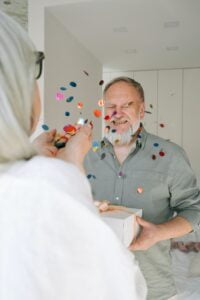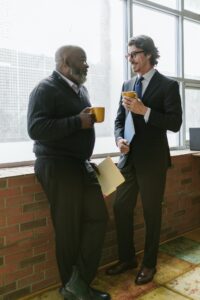 Aging in America can be an intimidating prospect. According to the U.S. Census Bureau, older adults are projected to outnumber children by the year 2034. Despite this evidence of an aging America, the elderly continue to be devalued and stigmatized.
Aging in America can be an intimidating prospect. According to the U.S. Census Bureau, older adults are projected to outnumber children by the year 2034. Despite this evidence of an aging America, the elderly continue to be devalued and stigmatized.
Some societies, such as Japan, respect their elderly and hold them in high esteem for their experience and wisdom. Old age is viewed as a normal stage of life and something to enjoy, as opposed to something to fear.
In America, however, youth is valued over old age, and the word “old” tends to be a put-down loaded with negative undertones. The elderly are often diminished, subject to age discrimination in the workforce, disrespected, stripped of dignity by being addressed in condescending or patronizing ways, and regarded as unimportant and less worthy of care.
Older adults are one of the only stigmatized groups that we all become part of some day. And that’s always struck me as interesting – that we would treat so poorly a group of people that we’re destined to become someday. – William Chopik, Assistant Professor of Psychology, MSU
America is obsessed with youth. People want to look younger and will lie about their age. Media fuels this desire by glorifying youth and beauty, and is one of the main perpetrators of prejudice and bias against the aging in America.
 Mass media depicts old people as frail, slow, forgetful, less competent, and senile. Ads featuring older people often reinforce these stereotypical images and messages. They perpetuate negative attitudes toward the elderly and what they can and cannot do, or should or should not do, that are out of whack with reality.
Mass media depicts old people as frail, slow, forgetful, less competent, and senile. Ads featuring older people often reinforce these stereotypical images and messages. They perpetuate negative attitudes toward the elderly and what they can and cannot do, or should or should not do, that are out of whack with reality.
This leaves many individuals to fear aging in America. They fear not having enough money to meet their basic needs, becoming a burden to their children, or ending up in a nursing home or homeless.
Negative stereotypes, even when unfounded, can be damaging to people’s egos and the way they view themselves. These stereotypes plant seeds of doubt in people’s minds that can have a negative impact on their physical and mental health, and ultimately on the length and quality of their life as well.
Seniors who are routinely subjected to negative stereotypes regarding their physical and cognitive abilities may start believing them, questioning their own competency. This often results in otherwise capable people underperforming or stopping doing things they are quite capable of doing.
 Harvard researcher, Becca Levy, conducted multiple studies on the impact of cultural age stereotypes on the health and lives of older people. The results indicate that seniors with a positive view of aging perform better physically and cognitively than those with a negative perception of it. They are more likely to have better memories, be able to walk faster, and recover from serious illness.
Harvard researcher, Becca Levy, conducted multiple studies on the impact of cultural age stereotypes on the health and lives of older people. The results indicate that seniors with a positive view of aging perform better physically and cognitively than those with a negative perception of it. They are more likely to have better memories, be able to walk faster, and recover from serious illness.
How elderly people perceive aging and how they approach it is one of the most noteworthy factors in longevity. The way elderly people perceive aging and approach it can subtract or add eight years to their lives.
Age beliefs are a part of aging well. If you are an older adult aging in America, be careful not to buy into negative stereotypes about aging or they may become the scripts you end up living out. Following are some Scripture verses you can substitute and internalize instead.
The glory of young men is their strength, gray hair the splendor of the old. – Proverbs 20:29, NIV
Gray hair is a crown of splendor; it is attained in the way of righteousness. – Proverbs 16:31, NIV
Is not wisdom found among the aged? Does not long life bring understanding? – Job 12:12, NIV
“Stand up in the presence of the aged, show respect for the elderly and revere your God. I am the LORD.” – Leviticus 19:32, NIV
 The righteous will flourish like a palm tree, they will grow like a cedar of Lebanon; planted in the house of the LORD, they will flourish in the courts of our God. They will still bear fruit in old age, they will stay fresh and green. — Psalm 92:12-14, NIV
The righteous will flourish like a palm tree, they will grow like a cedar of Lebanon; planted in the house of the LORD, they will flourish in the courts of our God. They will still bear fruit in old age, they will stay fresh and green. — Psalm 92:12-14, NIV
Moses was eighty years old and Aaron eighty-three when they spoke to Pharaoh. – Exodus 7:7, NIV
Moses was a hundred and twenty years old when he died, yet his eyes were not weak nor his strength gone. – Deuteronomy 34:7, NIV
Abraham lived a hundred and seventy-five years. Then Abraham breathed his last and died at a good old age, an old man and full of years; and he was gathered to his people. – Genesis 25:7-8, NIV
Do not conform to the pattern of this world, but be transformed by the renewing of your mind. Then you will be able to test and approve what God’s will is – his good, pleasing and perfect will. – Romans 12:2, NIV
If you are struggling with aging issues and would like to set up an appointment to meet with one of the faith-based counselors in our online directory, please don’t hesitate to give us a call today.
References:
Becca Levy. “How America’s ageism hurts, shortens lives of elderly.” The Harvard Gazette. August 10, 2022. news.harvard.edu/gazette/story/2022/08/how-ameicas-ageism-hurts-shortens-lives-of-elderly/.
Ragota Berger. “Aging in America: Ageism and General Attitudes toward Growing Old and the Elderly.” Scientific Research. August 2017. scirp.org/journal/paperinformation.aspx?paperid=78445.
Suzanne Wi. “Aging stereotypes can hurt older adults’ memory.” USC News. July 1, 2013. news.usc.edu/52707/aging-stereotypes-can-hurt-older-adults-memory/
Photos:
“Journaling”, Courtesy of Anastasia Shuraeva, Pexels.com, CC0 License; “Surprise!”, Courtesy of Ivan Samkov, Pexels.com, CC0 License; “Chatting”, Courtesy of RODNAE Productions, Pexels.com, CC0 License; “Standup Meeting”, Courtesy of Marcus Aurelius, Pexels.com, CC0 License




